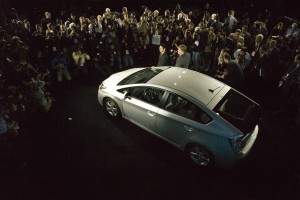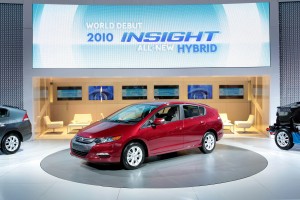
While the chase is from behind, Toyota can no longer take hybrid customers for granted.
Toyota Motor Sales U.S.A. surprised many industry observers today by announcing that the third-generation Prius will be available in at least one version with a starting MSRP of $21,000, plus $750 delivery.
A hybrid pricing war could be on the horizon.
In a sign of what was a lengthy — and unplanned — marketing discussion inside Toyota on whether to respond to Honda’s aggressive pricing, the lowest priced model will not be available until later in the year. The latest move is also an indication that Toyota can no longer assume it can command a premium in the battered automotive market.
The Prius will be offered with five levels of equipment combinations, designated as Prius I through V. They will range in price from $21,750 up to $34,250, when optional packages are included. Versions II through V go on sale in late May. The 2009 Prius model ranged in base asking prices from $22,720 to $24,990. The newly added new base model, with an as yet unspecified lower level of standard equipment, is scheduled to be available later this year.

There's nothing like a little competition to find out how strong demand actually is for hybrids.
When the all-new 2010 model of the Honda Insight went on sale last March 24th, Honda reversed a premium pricing philosophy that it once held along with the Toyota Prius. With a manufacturer’s suggested retail price (MSRP) of $19,800, plus $670 for delivery and any other options, the Insight LX, is now the least expensive new hybrid available in the U.S., but only by a negligible amount – if Toyota’s low-priced model ever appears.
The third-generation Toyota Prius has EPA estimated mileage of 50/49/50 mpg on the city/highway/combined scales and it clearly wins the coveted advertising claim of 50 mpg. Prius is about two inches longer, wider and taller than the Honda Insight, which looks to be a scaled down Prius.
The Insight is five-passenger, five-door dedicated hybrid vehicle that is powered by a 1.3-liter “i-VTEC” gasoline engine and a 10-kilowatt electric motor through a continuously variable ratio transmission. The electric motor is between the engine and the transmission, and adds power during acceleration and in certain cruising situations. It also recaptures energy from the vehicle’s forward momentum during braking. It has a less sophisticated powertrain than the Prius, and its mileage ratings reflect that.
Insight has an EPA-estimated city/highway/combined fuel economy ratings of 40/43/41 miles per gallon for all three trim levels are claimed, based on the post-2008 EPA methods. With a 10.6-gallon fuel tank, the Insight delivers an estimated maximum driving range exceeding 400 miles.
“The 2010 Prius delivers outstanding mileage, performance and advanced technology at a great price,” said Bob Carter, group vice president and general manager of the Toyota Division. Carter sees the most popular model starting at an MSRP of $22,000, equipped with what he calls a high level of standard features. “This model provides more than $2,000 added value, including the features most buyers want, at the same price as the current base model” he said.
Dealers in that past have been reluctant to stock lower-priced versions of vehicles since the profit margins are smaller. So it’s not clear how many of the lowest priced models from either Honda or Toyota will actually be sold. Marketing pricing data will be unreliable until both models have time to establish themselves.
Prius comes with Toyota’s Hybrid Synergy Drive, arguably the best in the business, and certified as an Advanced Technology Partial Zero Emissions Vehicle (AT-PZEV), as is the Insight. Toyota claims a Prius emits 70% fewer smog-forming emissions than the average new vehicle. A larger, more powerful yet more efficient, 1.8-liter Atkinson-cycle, four-cylinder engine produces 98 horsepower at 5,200 rpm. Together with its electric motor the hybrid system in the new Prius will generate a combined net horsepower of 134, an increase of 24 horsepower compared to the previous generation. Together with its gas and electric motor the Honda is rated at 98 horsepower.
All Prius models have a “Star Safety System” as standard equipment, which includes enhanced Vehicle Stability Control (VSC) and Traction Control (TRAC) Systems, Anti-lock Brake System (ABS) with Electronic Brake Force Distribution (EBD) and Brake Assist (BA). Other standard features include electric power steering and four-wheel disc brakes.
Globally, more than 1.3 million Toyota and 40,000 Lexus hybrid vehicles have been sold, compared to more than 300,000 Honda hybrids. Toyota commands a 75% share of the U.S. hybrid market since it established the segment a decade ago.
